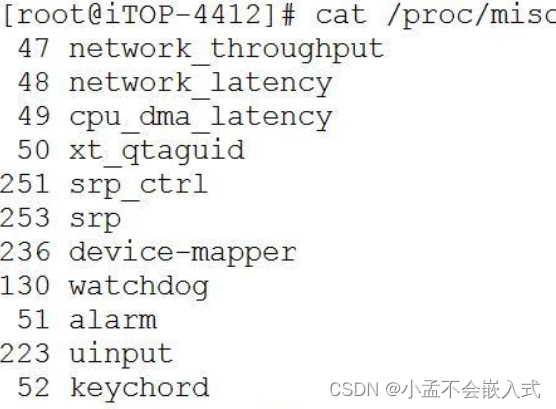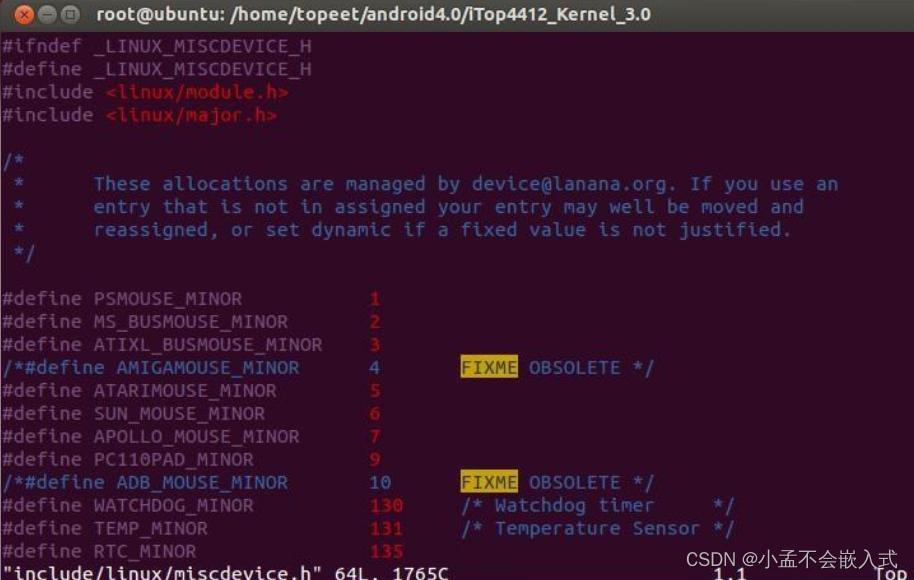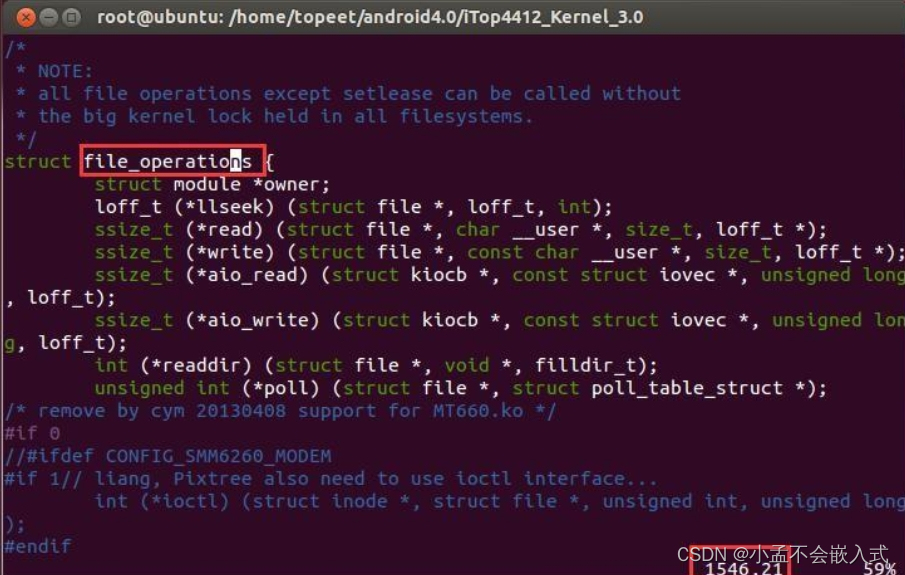一、为什么引入杂项设备
启动开发板, 在超级终端中输入命令“cat /proc/misc”也可以查看对应的杂项设备。
前面介绍过主设备号只有 256 个, 设备又非常多, 所以引入了子设备号。
其中杂项设备的主设备号是 10, 在任何 Linux 系统中它都是固定的。
一般将 Linux 驱动分为字符设备、 块设备、 网络设备, 但是这个分类不能包含所有的设备, 所以将无法归类的设备统称为杂项设备, 杂项设备可能用到字符设备、 快设备、 网络设备中的一项或者多项设备。这样杂项设备的引入即解决了设备号数量少的问题, 又降低了使用难度, 还能防止碎片化, 一举多得。
二、杂项设备注册函数及结构体
杂项设备的头文件在“include/linux/miscdevice.h” , 有两个需要掌握的函数和一个结构体, 如下图所示, 在源码目录下使用命令“vim include/linux/miscdevice.h” 。

extern int misc_register(struct miscdevice * misc);
extern int misc_deregister(struct miscdevice *misc);杂项设备注册函数; 一般在 probe 中调用, 参数是 miscdevice
杂项设备卸载函数; 一般是在 hello_remove 中用于卸载驱动。
结构体 miscdevice 中参数很多, 下面几个是常用的。int .minor; 设备号, 赋值为 MISC_DYNAMIC_MINOR, 这个宏定义可以查到为 10 const char *name;设备名称
const struct file_operations *fops; file_operations 结构体, 在下一小节专门介绍。
三、file_opreation结构体
file_operations 结构体的成员函数属于驱动设计的主体内容, 里面的函数和 Linux 系统给应用程序提供系统接口一一对应。
file_operations 结构体在头文件“include/linux/fs.h” 中, 如下图所示, 使用命令“vim include/linux/fs.h”打开头文件。

如上图所示, 可以看到结构体中包含的参数非常多。
struct module *owner;一般是 THIS_MODULE。
int (*open) (struct inode *, struct file *);对应上层的 open 函数, 打开文件。
int (*release) (struct inode *, struct file *);对应上层的 close 函数, 打开文件操作之后一般需要关闭。
ssize_t (*read) (struct file *, char user *, size_t, loff_t *);读函数, 上层应用从底层读取函数。
ssize_t (*write) (struct file *, const char user *, size_t, loff_t *);写函数, 上层应用向底层传输数据。
long (*unlocked_ioctl) (struct file *, unsigned int, unsigned long);这个函数功能和写函数稍微有点重合, 但是这个函数占用的内存非常小, 主要针对 IO 口的控制。
四、代码例程
#include <linux/init.h>
#include <linux/module.h>
/*驱动注册的头文件,包含驱动的结构体和注册和卸载的函数*/
#include <linux/platform_device.h>
/*注册杂项设备头文件*/
#include <linux/miscdevice.h>
/*注册设备节点的文件结构体*/
#include <linux/fs.h>
#define DRIVER_NAME "hello_ctl"
#define DEVICE_NAME "hello_ctl123"
MODULE_LICENSE("Dual BSD/GPL");
MODULE_AUTHOR("TOPEET");
static long hello_ioctl( struct file *files, unsigned int cmd, unsigned long arg){
printk("cmd is %d,arg is %d\n",cmd,arg);
return 0;
}
static int hello_release(struct inode *inode, struct file *file){
printk(KERN_EMERG "hello release\n");
return 0;
}
static int hello_open(struct inode *inode, struct file *file){
printk(KERN_EMERG "hello open\n");
return 0;
}
static struct file_operations hello_ops = {
.owner = THIS_MODULE,
.open = hello_open,
.release = hello_release,
.unlocked_ioctl = hello_ioctl,
};
static struct miscdevice hello_dev = {
.minor = MISC_DYNAMIC_MINOR,
.name = DEVICE_NAME,
.fops = &hello_ops,
};
static int hello_probe(struct platform_device *pdv){
printk(KERN_EMERG "\tinitialized\n");
misc_register(&hello_dev);
return 0;
}
static int hello_remove(struct platform_device *pdv){
printk(KERN_EMERG "\tremove\n");
misc_deregister(&hello_dev);
return 0;
}
static void hello_shutdown(struct platform_device *pdv){
;
}
static int hello_suspend(struct platform_device *pdv,pm_message_t pmt){
return 0;
}
static int hello_resume(struct platform_device *pdv){
return 0;
}
struct platform_driver hello_driver = {
.probe = hello_probe,
.remove = hello_remove,
.shutdown = hello_shutdown,
.suspend = hello_suspend,
.resume = hello_resume,
.driver = {
.name = DRIVER_NAME,
.owner = THIS_MODULE,
}
};
static int hello_init(void)
{
int DriverState;
printk(KERN_EMERG "HELLO WORLD enter!\n");
DriverState = platform_driver_register(&hello_driver);
printk(KERN_EMERG "\tDriverState is %d\n",DriverState);
return 0;
}
static void hello_exit(void)
{
printk(KERN_EMERG "HELLO WORLD exit!\n");
platform_driver_unregister(&hello_driver);
}
module_init(hello_init);
module_exit(hello_exit);























 1068
1068











 被折叠的 条评论
为什么被折叠?
被折叠的 条评论
为什么被折叠?










